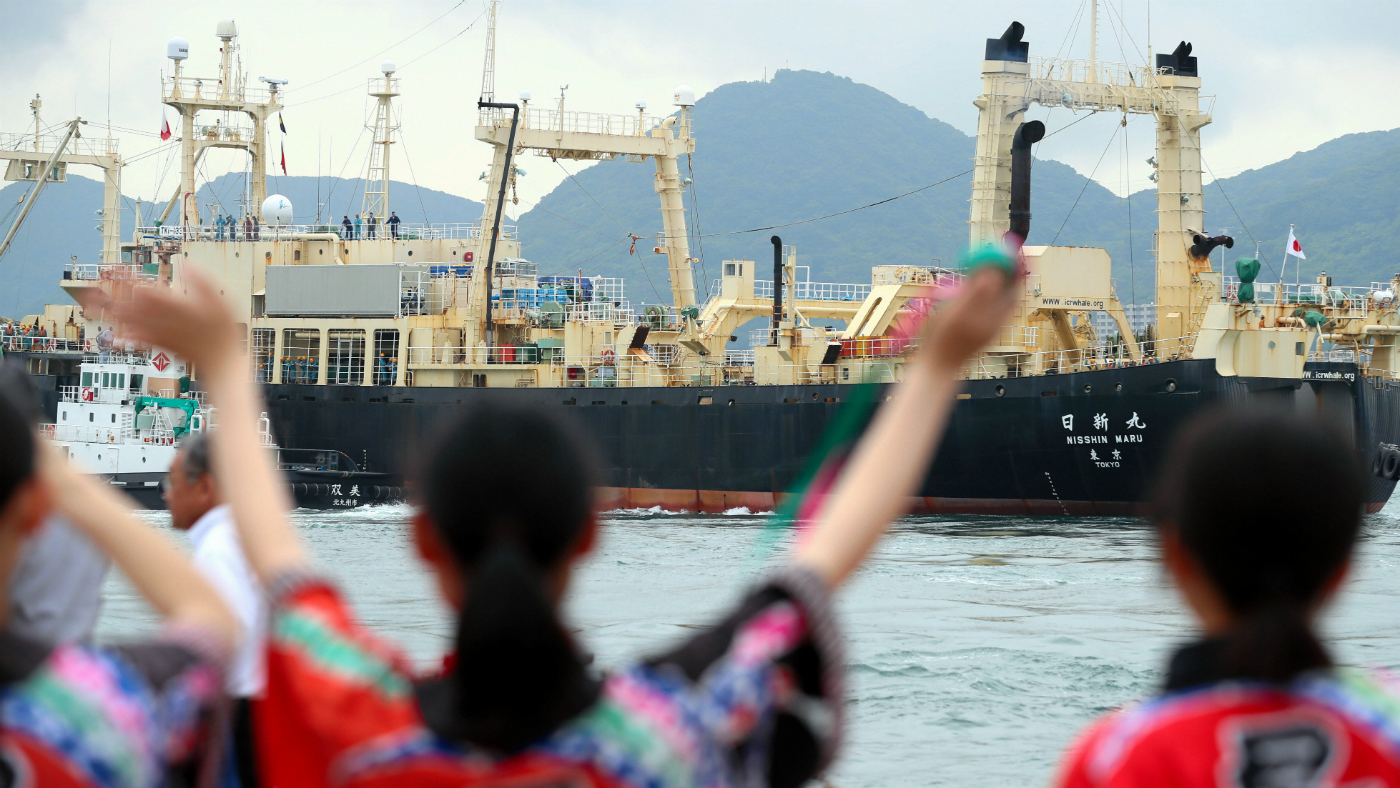Did Japan ever really stop commercial whaling?
Conservationists condemn Tokyo’s decision to lift ban on whale hunting

A free daily email with the biggest news stories of the day – and the best features from TheWeek.com
You are now subscribed
Your newsletter sign-up was successful
Japanese whalers brought ashore their first catches this week as the country lifted a ban on commercial whaling that has been in place since 1986.
In defiance of international condemnation, Japan has become the latest member of the International Whaling Commission (IWC) to withdraw from the body, which banned hunting of whales.
The BBC reports that the country sent out its first whaling fleet on 1 July, with permits to catch 227 whales. Japan Today adds that the killing of the first whales was marked by celebrations on shore that saw whalers lining up to “pour ceremonial cups of the Japanese liquor sake over the animal”.
The Week
Escape your echo chamber. Get the facts behind the news, plus analysis from multiple perspectives.

Sign up for The Week's Free Newsletters
From our morning news briefing to a weekly Good News Newsletter, get the best of The Week delivered directly to your inbox.
From our morning news briefing to a weekly Good News Newsletter, get the best of The Week delivered directly to your inbox.
“Today is the best day,” said Yoshifumi Kai, head of the Japan Small-Type Whaling Association. “It was worth waiting for 31 years.”
“My heart is overflowing with happiness, and I’m deeply moved,” the BBC quotes him as saying. “People have hunted whales for more than 400 years in my hometown.”
RTE reports that Japan has already begun “dismissing international outrage” over its decision to resume the practice, which activists call “inhumane and obsolete”. Campaigners point out that the industry provides employment for only a few hundred people and accounted for less than 0.1% of the total meat consumption in 2017.
Japan’s refusal to back down on the issue is grounded in a lengthy history of making full use of exemptions in the treaty. Since the ban came into place 33 years ago, Japan has continued to conduct so-called research missions that result in the deaths of hundreds of whales each year.
A free daily email with the biggest news stories of the day – and the best features from TheWeek.com
So did Japan really stop whaling?
Whale hunting almost wiped out global whale populations in the first half of the 20th century, before the rapid industrialisation of the industry in the 1950s and 1960s prompted calls to regulate whaling globally.
In 1986, members of the IWC agreed to a hunting moratorium to allow whale numbers to recover.
But Japan was one of a number of signatories to the moratorium - including Norway and Iceland - which remained home to communities that relied on whale hunting, either for food or employment. These countries signed the treaty because they believed the moratorium would be temporary until everyone could agree on sustainable quotas, write former IWC chair Peter Bridgewater and Sui Phang, a research fellow at the University of Portsmouth, in an article on The Conversation.
Instead, the moratorium became a permanent ban, prompting Japan, Norway and Iceland to exploit loopholes in the treaty that allows “indigenous groups to carry out subsistence whaling, and allowing whaling for scientific purposes”.
Since being granted permission to resume whaling under these circumstances, Japan has killed between 200 and 1,200 whales each year since 1987.
Do Japanese people really want whale meat?
Not to any extent that would require the ban to be lifted.
According to The New York Times, whale meat was an “affordable source of protein during the lean times after World War II, with annual consumption peaking at 223,000 tons in 1962”, but was quickly replaced by other meats during the country’s post-war economic boom.
As a result, the supply of whale meat fell to just 6,000 tons by 1986, and only around 4,000-5,000 tons are supplied in Japan annually today.
Despite whaling having been part of Japanese culture for hundreds of years, whale makes up about 0.1% of all meat eaten in Japan in a year.
Furthermore, it appears profits are not a legitimate justification; the research whaling programme operated by the Japanese government lost money for years, with over 1.6 billion yen (£11.7 million) lost in the last year alone.
Why have they lifted the ban then?
The main arguments for leaving the IWC centre on Japan’s insistence that the practice is culturally important, while also reminding the international community that it never signed up for a permanent ban.
According to The Daily Telegraph, Japanese officials say the hunts will “protect an ancient tradition”.
“The resumption of commercial whaling has been an ardent wish for whalers across the country,” Shigeto Hase, the head of Japan’s fisheries agency, said at the departure ceremony in Kushiro. “The culture and way of life will be passed on to the next generation.”
But to international observers, the move is merely a capitulation to Japanese whaling communities, whom activists accuse of falsely claiming their hunting is based in research.
But whether or not this is a good thing is up for debate.
“This is a sad day for whale protection globally,” Nicola Beynon, of Humane Society International, told Al Jazeera. “The word ‘research’ may have been removed from the side of the factory ship, finally ending Japan’s charade of harpooning whales under the guise of science, but these magnificent creatures will still be slaughtered for no legitimate reason.”
However, Patrick Ramage, head of the International Fund for Animal Welfare, called the move a “face-saving solution” that could eventually lead Japan to abandon whaling, rather than attempting to downplay it or keep it a secret.
“It’s a good decision for whales, it’s a good decision for Japan, and it’s a good decision for international marine conservation,” he said.
As for whales, the outcome will probably be mixed. Whale populations in the Southern Ocean are “likely to benefit as Japan will lose its special research permit for scientific whaling in the region by leaving the IWC”, and instead be restricted to whaling within its own exclusive economic zone, say Bridgewater and Phang on The Conversation.
“No longer bound by the IWC’s rules, Japan can harvest whales here under the right given by the UN Convention on the Law of the Sea but the number and species it will decide to take hasn’t been announced,” the news site reports.
-
 How to Get to Heaven from Belfast: a ‘highly entertaining ride’
How to Get to Heaven from Belfast: a ‘highly entertaining ride’The Week Recommends Mystery-comedy from the creator of Derry Girls should be ‘your new binge-watch’
-
 The 8 best TV shows of the 1960s
The 8 best TV shows of the 1960sThe standout shows of this decade take viewers from outer space to the Wild West
-
 Microdramas are booming
Microdramas are boomingUnder the radar Scroll to watch a whole movie
-
 North Korea launches 1,000km missile towards Japan after threatening US
North Korea launches 1,000km missile towards Japan after threatening USSpeed Read Pyongyang warned Washington of ‘shocking’ repercussions over alleged spy planes
-
 Company teaches mask-wearers to smile again
Company teaches mask-wearers to smile againfeature And other stories from the stranger side of life
-
 Japanese vending machines to automatically offer free food in earthquakes
Japanese vending machines to automatically offer free food in earthquakesSpeed Read Supply of nutritional supplements and drinks would be unlocked in the event of a major disaster
-
 Man throws explosive device at Japanese prime minister
Man throws explosive device at Japanese prime ministerSpeed Read
-
 Squirrels’ reign of terror in kitchen
Squirrels’ reign of terror in kitchenfeature And other stories from the stranger side of life
-
 Bear meat vending machines a surprise hit
Bear meat vending machines a surprise hitfeature And other stories from the stranger side of life
-
 Japanese YouTube star ousted from parliament after not showing up
Japanese YouTube star ousted from parliament after not showing upSpeed Read
-
 The Week Unwrapped: Korean succession, terror by algorithm and German disquiet
The Week Unwrapped: Korean succession, terror by algorithm and German disquietpodcast Could a 10-year-old girl rule North Korea? Will an Isis victim upend web law? And why is Germany upset with its Oscars contender?